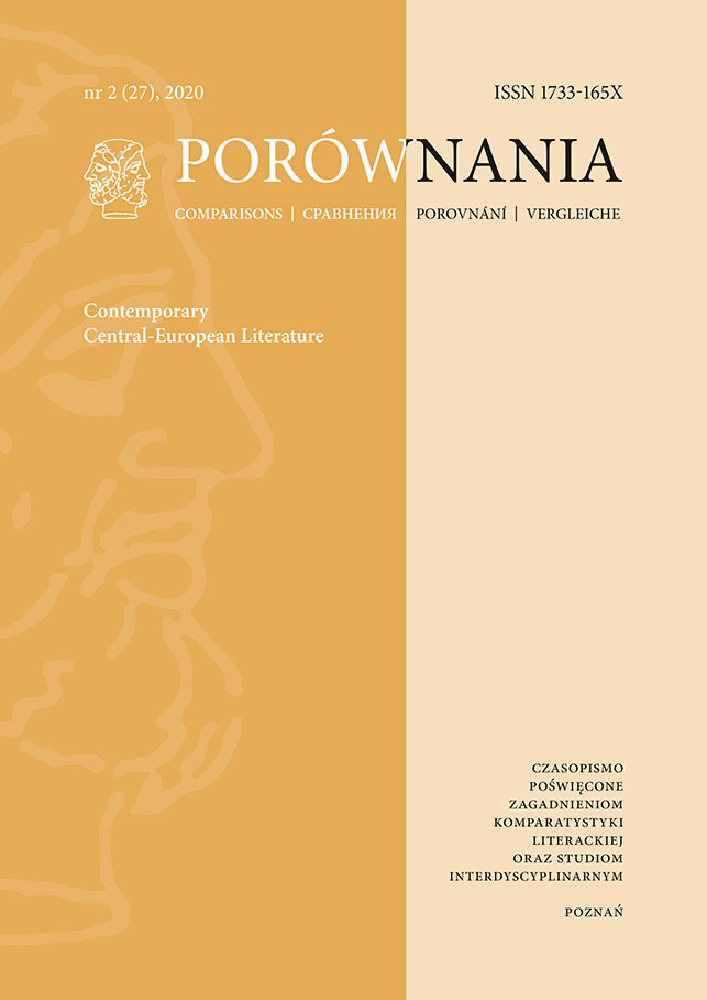Аннотация
This study focuses on Adam Borzič, one of the most distinctive contemporary Czech poets. The study contextualises his work within current Czech poetry but also examines his other work that is not strictly classified as art as though it were cultural work with avant-garde features. It investigates four volumes of Borzič’s work in terms of the changes in the author’s creative gesture, which expands from his conviction that the world is at a turning point and the avant-garde longing to change the world by poetry. In the four volumes of Borzič’s poetry (written so far), this gesture is embodied through delicately intimate, acutely physical, or even gigantically all-embracing positions, where he employs motives of the heart, head, hand and mouth. The study attempts to evaluate the change in Borzič’s work in the light
of T. S. Eliot’s understanding of the social role of poetry and avant-garde longing to change reality through art. The Czech poet, Adam Borzič, is one of the most distinctive figures of the current Czech literary scene. His poetry is distinct because of its unique gesture and
also represents a strong current in the poetry production of the past decade with its emphasis on the social function of poetry7 and the poet’s role as somebody who should nurture the world through his/her work or even change it. This study attempts to portray Borzič’s work as focused on the mentioned topics and related issues of the end of the first decade of the twenty-first century and renew interest in them, contextualise his work within current Czech poetry but also investigate his other work, which is not strictly artistic but which possesses some avant-garde features.
Библиографические ссылки
Borzič, Adam. Rozevírání. (Opening Up). Praha: Dauphin, 2011.
Borzič, Adam. Počasí v Evropě. (Weather in Europe). Praha: Malvern, 2013.
Borzič, Adam. Orfické linie. (Orphic Lines). Praha: Malvern, 2015.
Borzič, Adam. “Poezie a přesah.” (Poetry Exceeding Its Role). Deník Referendum (The Referendum Dairy). 2 August 2015, https://tinyurl.com/yxo3u6sd. Accessed 10 December 2019.
Borzič, Adam. Západo-východní zrcadla. (Westernly Eastern Mirrors). Praha: Malvern, 2018.
Borzič, Adam, Kamil Bouška and Petr Řehák. Fantasía. Praha: Dauphin, 2008.
Bouška, Kamil. “Čekají nás nové avantgardy. S Kamilem Bouškou o literátštině a čtení poezie.” (New Avantgarde’s Await Us: On the Language of Writing and Poetry with Kamil Bouška). A2 4 (2019): 20–21.
Bouška, Kamil. Inventura. (Stocktaking). Praha: Fra, 2018.
Groys, Boris. Gesamtkunstwerk Stalin. Rozpolcená kultura v Sovětském svazu. (Gesamtkunstwerk Stalin. The Riven Soviet Culture). Trans. Martin Ritter, Praha: AVU, 2010.
Eliot, T. S. O básnictví a básnících. (On Poetry and Poets). Trans. Martin Hilský. Praha: Odeon, 1991.
Kalista, Zdeněk. Tváře ve stínu. (Faces in the Shadow). Praha: Torst, 2016.
Pazdiorová, Helena. “Jenom psát nestačí. Podoby současné ukrajinské poezie.” (Just Writing Is not Enough: The Forms of Current Ukrainian Poetry). A2 7 (2019): 9.
Piorecký, Karel. “Česká literární kultura 2001–2010.” (Czech literary culture 2001–2010). V souřadnicích mnohosti: Česká literatura první dekády 21. století v souvislostech a interpretacích. (Within the Coordinates of Plurality: Czech Literature of the First Decade of the 21th Century in its Context and Interpretations). Ed. Alena Fialová. Praha: Academia, 2014. 13–50.
Řehák, Petr. Násobit ruce. (Multiplying Hands). Praha: Malvern, 2014.
Stehlíková, Olga. “Toto nové a to staré” (This New and the Old). Nejlepší české básně 2014 (The Best Czech Poetry of 2014). Ed. Petr Hruška and Olga Stehlíková. Brno: Host, 2014. 96–133.
Zizler, Jiří. “Otevřená dekáda.” (An opened decade.) V souřadnicích volnosti: česká literatura devadesátých let dvacátého století v interpretacích. (Within the Coordinates of Freedom: Czech Literature of the 1990s in Interpretations). Ed. Petr Hruška et al. Praha: Academia, 2018. 11–34.
|
Лицензия
Utwory opublikowane w czasopiśmie „Porównania”, na platformie Pressto należącej do Uniwersytetu im. Adama Mickiewicza w Poznaniu są udostępniane na licencji Creative Commons Uznanie autorstwa - Bez utworów zależnych 4.0 Międzynarodowe (CC BY-ND 4.0)
Tym samym wszyscy zainteresowani są uprawnieni do korzystania z utworów opublikowanych pod następującymi warunkami:
-
uznania autorstwa — czyli obowiązek podania wraz z rozpowszechnianym utworem informacji o autorstwie, tytule, źródle (odnośniki do oryginalnego utworu, doi) oraz samej licencji
-
bez utworów zależnych — remiksując, przetwarzając lub tworząc na podstawie utworu, nie wolno rozpowszechniać zmodyfikowanych treści.
-
brak dodatkowych ograniczeń — nie można korzystać ze środków prawnych lub technologicznych, które ograniczają innych w korzystaniu z utworu na warunkach określonych w licencji.
Uniwersytet im. Adama Mickiewicza w Poznaniu zachowuje prawo do czasopisma jako całości (układ, forma graficzna, tytuł, projekt okładki, logo itp.).
Autor zachowuje prawa majątkowe, ale udziela zgody Uniwersytetowi im. Adama Mickiewicza w Poznaniu na wykorzystanie dzieła. Autorzy tekstów zakwalifikowanych do publikacji proszeni są o wypełnienie podpisanie i przesłanie umowa (PL) agreement (EN)
Agreement for granting a royalty-free license to works with a commitment to grant a CC sub-license




